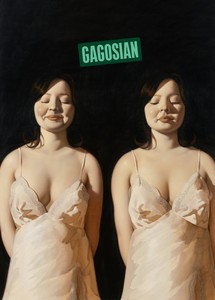
Now available
Gagosian Quarterly Winter 2022
The Winter 2022 issue of Gagosian Quarterly is now available, featuring Anna Weyant’s Two Eileens (2022) on its cover.
Any good work of art should have at least ten meanings.
—Walter De Maria
In his sculptures, land works, and installations, Walter De Maria (1935–2013) explored the relationship between the relative and the absolute, using basic geometric components to produce sublime repetitions. By arranging forms according to mathematical sequences, he worked at the intersections of Minimalism, conceptual art, and land art—drawing attention to the limits of gallery spaces, prioritizing bodily awareness, and locating the content of an artwork in the viewer.
In 1960, after completing his master’s degree at the University of California, Berkeley, De Maria moved to New York City; two years later, he showed his work at a gallery he cofounded with Robert Whitman at 9 Great Jones Street. Influenced by his peers, including Donald Judd and Fluxus member La Monte Young, he produced serialized and numbered sculptural sets of cast and polished steel.
De Maria’s precise polygonal structures impart a sense of the absolute. 14-Sided Open Polygon (1984), a stainless steel tetradecagon containing a steel ball, is emblematic of this distillation. The Pure Polygon Series (1975–76) is a suite of seven pencil drawings of basic geometric outlines in which a single side is added sequentially to change each shape, beginning with a triangle and ending with a heptagon. In 1977 The Lightning Field was installed in a remote area of the desert in western New Mexico. The work comprises four hundred polished stainless steel poles installed in a grid measuring one mile by one kilometer; the poles, meant to attract lightning, measure over twenty feet tall and have solid pointed tips that define a horizontal plane. The visitor both walks within the grid and views it from afar, observing it over an extended period of time and through space. Other major installations include The Broken Kilometer (1979), five hundred identical brass rods arranged in five rows, which, if placed end to end, would measure one kilometer; The New York Earth Room (1977), a white-walled SoHo loft filled with 280,000 pounds of soil; and The Vertical Earth Kilometer (1977), a one-kilometer-tall brass rod that stretches toward the sky from Friedrichsplatz Park in Kassel, Germany.
Truth / Beauty (1990–2016), a series of fourteen sculptures in seven pairs, was installed at Gagosian on Britannia Street in London in 2016, then at Gagosian in Le Bourget in 2016–17. At Le Bourget, the works were visible from the gallery’s mezzanine passerelle, recalling the 1981–82 installation of De Maria’s 360° I Ching / 64 Sculptures at Centre Georges Pompidou in Paris, where the rods were arranged within a sunken area of the museum’s lobby floor.
In 2017 the Walter De Maria Estate and Gagosian collaborated to posthumously complete the artist’s final work, Truck Trilogy (2011–17), comprising three 1950s Chevrolet pickup trucks, each stripped of all extraneous elements and fitted with three vertical stainless steel rods in its bed: one circular in section, one square, and one triangular. Truck Trilogy was installed at Dia:Beacon in 2017 for two years.
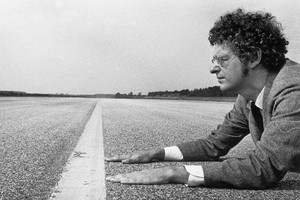

The Winter 2022 issue of Gagosian Quarterly is now available, featuring Anna Weyant’s Two Eileens (2022) on its cover.
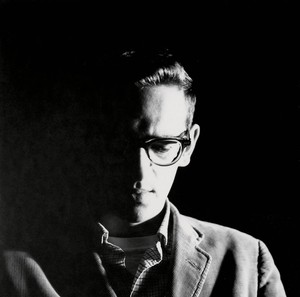
The definitive monograph on the work of Walter De Maria was published earlier this fall. To celebrate this momentous occasion, Elizabeth Childress and Michael Childress of the Walter De Maria Archive talk to Gagosian senior director Kara Vander Weg about the origins of the publication and the revelations brought to light in its creation.
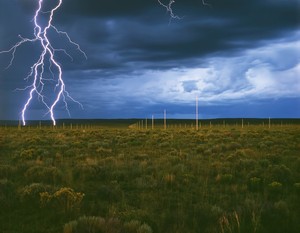
In this second installment of a two-part essay, John Elderfield resumes his investigation of Walter De Maria’s The Lightning Field (1977), focusing this time on how the hope to see lightning there has led to the work’s association with the Romantic conception of the sublime.
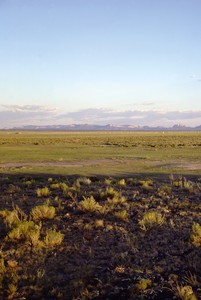
In the first of a two-part feature, John Elderfield recounts his experiences at The Lightning Field (1977), Walter De Maria’s legendary installation in New Mexico. Elderfield considers how this work requires our constantly finding and losing a sense of symmetry and order in shifting perceptions of space, scale, and distance, as the light changes throughout the day.
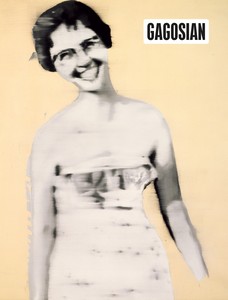
The Spring 2021 issue of Gagosian Quarterly is now available, featuring Gerhard Richter’s Helen (1963) on its cover.
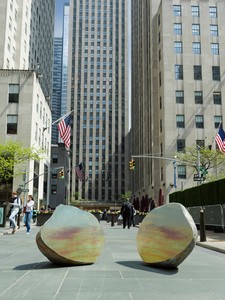
The inaugural presentation of Frieze Sculpture New York at Rockefeller Center opened on April 25, 2019. Before the opening, Brett Littman, the director of the Isamu Noguchi Foundation and Garden Museum and the curator of this exhibition, told Wyatt Allgeier about his vision for the project and detailed the artworks included.

Lars Nittve investigates Truck Trilogy, Walter De Maria’s last work, conceived in 2011 and premiered at Dia:Beacon in 2017.
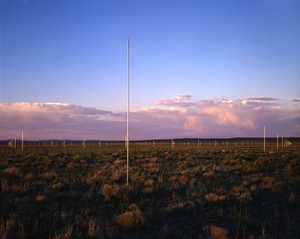
Artist Terry Winters, longtime friend of De Maria and member of the installation crew for The Lightning Field, recounts a trip to New Mexico and the surrounding area and attests to the power—the “rhythm and pulse of ancient mystery”—that continues to imbue De Maria’s artworks into the present day.
Request more information about
Walter De Maria